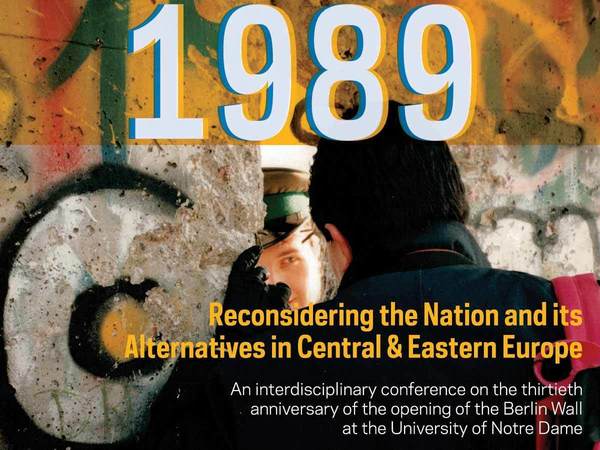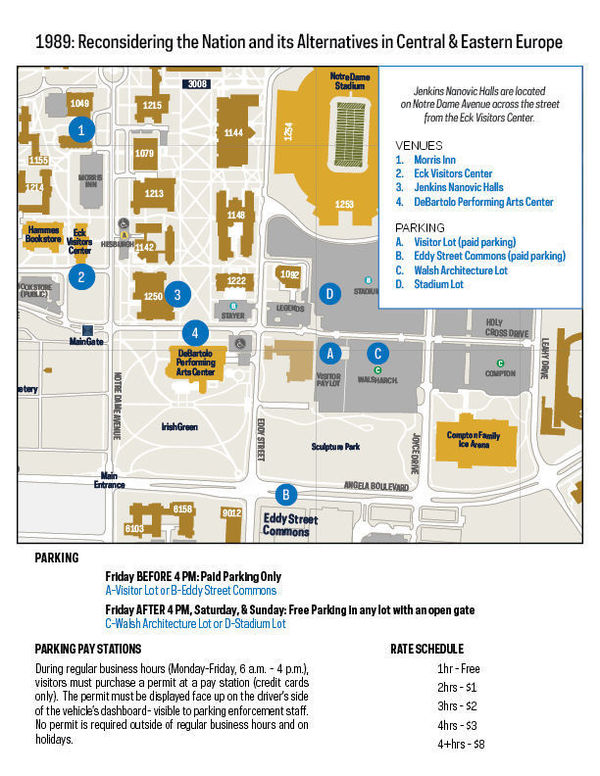The collapse of socialist regimes across Eastern Europe in 1989 has often been described as an “autumn of nations”, a process of national liberation from unaccountable governments through the exercise of popular will. But during and after 1989, national mobilization also coincided with tectonic international and supranational developments: the collapse of the Soviet empire, the retrenchment of socialist internationalism, the expansion of NATO, and the widening scope of European integration, to name only a few. Moreover, the tacit consensuses around nations’ memberships and democratic objectives apparent in 1989 have since given way to contested, and sometimes alarming, discourses of nationhood. Across Central and Eastern Europe, Islamophobic and anti-immigrant politics have revived intense debates over national belonging.
On the thirtieth anniversary of the opening of the Berlin Wall, the Nanovic Institute will host an interdisciplinary conference to reconsider the European “nation”, “national identity”, and alternative modes of political mobilization in 1989, its aftermath, and its commemoration.
We welcome a broad range of methodological approaches for presentations focused on Germany and Eastern Europe, including historical and social scientific, as well as perspectives informed by cultural, literary, music, art, and film studies. Potential topics may include, but are not limited to:
- The “Nation” in 1989:
- The role of the “nation” and the mobilization of “national identity” in challenging socialist regimes. The place of the “nation” in protest movements’ imagination of post-socialist futures.
- Organizing popular protests, circumventing censorship, and evading state discipline in illiberal regimes.
- The role of artists and writers in expressing popular grievances in socialist societies.
- Refugees, asylum seekers, and transnational migration during and after 1989.
- Hw “national” contexts inflected societies’ post-socialist transitions.
- Alternatives to the “Nation” and the “National” in 1989:
- The progressive collapse of the Soviet Empire and socialist internationalism as a mode of international organization.
- Attempts t reform or salvage socialism in 1989.
- European institutions and other communities or organizations which offered possible alternatives to the “nation” as nodes of political organization.
- Religious communities’ relation to the “nation” and socialist governments.
- Encounters of East Germans and East Europeans with Western European and Transatlantic material culture, art, music, literature, and pop culture.
- Gender and the collapse of state socialism, “national” mobilization, and/or transnational encounters.
- The “Nation” and its Alternatives since 1989.
- The rise of far-right, populist, and anti-immigrant political movements in Central and Eastern Europe.
- The role of the “nation” in discussions of European integration.
- Nostalgia for, or national appropriation of, legacies, aspects, and artifacts of socialist dictatorships.
- The integrating of former citizens of the GDR into a united Germany.
- The place of art, music, literature, film, and / or theater in defining the scope of the nation or negotiating post-’89 transformations.
- The role of the Catholic, Protestant, and Orthodox churches in shaping European and national identities, culture, and politics.
- Gender and the imagination of European and national values and identities.
- Nationalism in post-soviet space and Russia’s instrumentalization of minority nationalist politics.
We welcome proposals for both individual papers and full panels. Conference presenters will speak for fifteen minutes. Individual paper proposals should include a title and a brief, 300-600 word abstract. Complete panel proposals should include a 300-500 word panel abstract, as well as paper abstracts for three individual presenters. Proposals should be submitted directly to the Nanovic Institute Website, by June 1, 2019. We will notify you of your acceptance by July 1, 2019. Conference papers will be submitted by October 1, 2019, for pre-circulation within panels.
Please contact the conference co-director, Mark T. Kettler ( mkettler@nd.edu ), with any questions.
The collapse of socialist regimes across Eastern Europe in 1989 has often been described as an “autumn of nations,” a process of national liberation from unaccountable governments through the exercise of popular will. But during and after 1989, national mobilization also coincided with tectonic international and supranational developments: the collapse of the Soviet empire, the retrenchment of socialist internationalism, the expansion of NATO, and the widening scope of European integration, to name only a few. Moreover, the tacit consensuses around nations’ memberships and democratic objectives apparent in 1989 have since given way to contested, and sometimes alarming, discourses of nationhood. Across Central and Eastern Europe, Islamophobic and anti-immigrant politics have revived intense debates over national belonging.
On the thirtieth anniversary of the opening of the Berlin Wall, the Nanovic Institute will host an interdisciplinary conference to reconsider the European “nation,” “national identity,” and alternative modes of political mobilization in 1989, its aftermath, and its commemoration.
Keynote Address: The Politics of East Central Europe 30 Years after the Fall of the Berlin Wall
Saturday, November 9
6:00 PM | Auditorium, Eck Visitors Center
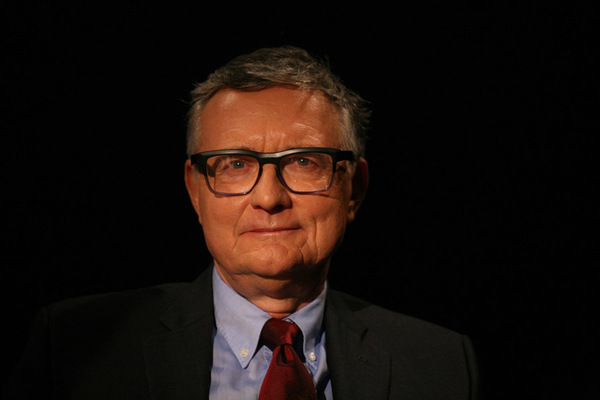 Grzegorz Ekiert, Harvard University
Grzegorz Ekiert, Harvard University
During the first two decades after 1989, countries of East Central Europe experienced a fast and successful democratization process, followed by a relatively painless transition to a market economy. Consolidation of liberal democracies and emergence of working market economies across the region opened the door to their accession to NATO and to their membership in the European Union. By 2004, it seemed that countries of the region became “normal” European democracies with respectable economic performance and generous welfare state. Any lingering concerns about the stability of their newly established democratic order and their commitment to the rule of law and liberal values could be safely put to rest.
Yet, the third decade of post-communism witnessed ascendance of ultra nationalist leaders and governments that have presided over the marked erosion of democratic commitments and liberal principles. In particular, FIDESZ In Hungary and PiS in Poland have begun deliberate assault on judicial independence, independent media, the rule of law and fundamental values of the European integration often with violation of their countries’ constitutions and despite the concerns of their European partners. Increasing shift to authoritarian rule and away from Europe in these two countries is especially puzzling, since they were leading reformers under the communist rule, led the region away from communism and were considered the success stories of post-communist transformations. This address will focus on explaining trajectories of political developments in the region since 1989 and ways to understand the current rise of nationalism and unfolding authoritarian backsliding.
Grzegorz Ekiert is Laurence A. Tisch Professor of Government at Harvard University, Director of the Minda de Gunzburg Center for European Studies, and Senior Scholar at the Harvard Academy for International and Area Studies. His research and teaching interests focus on comparative politics, regime change and democratization, civil society and social movements and East European politics and societies. His current projects explore civil society development in new democracies in Central Europe and East Asia, state mobilized contention in authoritarian and hybrid regimes and patterns of political and economic transformations in the post-communist world. He is the author or editor of several books, edited volumes and special issues of journals. His papers appeared in numerous social science journals in the US, Europe and Asia and in many edited volumes. He is also Member of the Advisory Board of Wissenschaftszentrum Berlin fur Sozialforschung, External Examiner in Politics, Public Administration and Global Studies at the University of Hong Kong and Member of the Club of Madrid Advisory Committee.
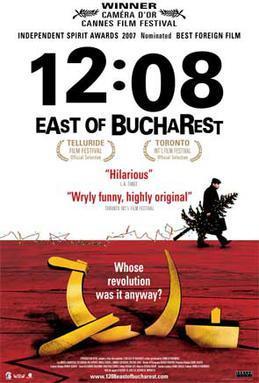
Film Screening
12:08 EAST OF BUCHAREST (A FOST SAU N-A FOST?)
6:00 PM, Browning Cinema, Debartolo Performing Arts Center
A local talk show host organizes an alcoholic professor and a pensioner known for playing Santa Claus to decide whether there was ever a revolution in their town Vaslui.
Alina Haliliuc, Associate Professor of Communication at Denison University, will introduce the film and lead a post-screening Q&A session.
As a rhetorician, Haliliuc reads a variety of cultural forms – from public debates and museums to live performances and film – with a curiosity for how they shape and reflect the affective, ethical, and political imagination of post-communist subjects. Her work may be found in such journals as The Journal of Popular Culture, Film Criticism, Communication, Culture & Critique, and Text and Performance Quarterly.
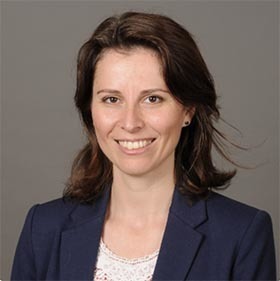 Alina Haliliuc, Denison University
Alina Haliliuc, Denison University
Please register for all events you will be attending
Friday, November 8, 2019
6:00 P.M. FILM 12:08 EAST OF BUCHAREST (A FOST SAU N-A FOST?)
- Browning Cinema, DeBartolo Performing Arts Center (Open to the public)
Alina Haliliuc, Denison University
Film introduction and post-film Q&A session.
Saturday, November 9, 2019
8:30 A.M. BREAKFAST
- The Forum, First Floor, Jenkins Nanovic Halls
9:00 -10:30 A.M. “I WAS THERE” PANEL / ROUNDTABLE
- Donald R. Keough Seminar Room, 1030 Jenkins Nanovic Halls
Tobias Boes, University of Notre Dame
Maurizio Albahari, University of Notre Dame
A. James McAdams, University of Notre Dame
Martin Kagel, University of Georgia
10:30 A.M. BREAK WITH REFRESHMENTS
11:00 A.M. - 12:30 P.M. SIMULTANEOUS PANELS
- Seminar Rooms, First Floor, Jenkins Nanovic Halls
AFTERLIVES OF THE GDR IN GERMAN FILM
- Elizabeth E. Nanovic Seminar Room, 1050 Jenkins Nanovic Halls
Commentator: Mark Roche, University of Notre Dame
Martin Kagel, University of Georgia | “Unhappy End: Understanding Silence in Andreas Dresen’s Stilles Land”
William Collins Donahue, University of Notre Dame | “Contested Legacies of East German Socialism: Andreas Dresen’s Gundermann"
Anke Pinkert, University of Illinois | “Memorial Things: Future Revolution in Karl Marx City/Chemnitz”
NEW NATIONAL NARRATIVES IN POST-COMMUNIST EUROPE
- Donald R. Keough Seminar Room, 1030 Jenkins Nanovic Halls
Commentator: Heather Stanfiel, University of Notre Dame
Volodymyr Sklokin, Ukrainian Catholic University | “Toward an Intellectual Genealogy of Conservative Turn In Contemporary Poland: a Case of Arcana Magazine”
Nicole Burgoyne, University of Chicago | “November 4th 1989: East Germany’s Cultural Elite Looks Forward to a New Era of German Socialism”
Nina Paulovicova, Athabasca University | “From Nostalgia and Identity Crisis to a ‘Proud Nation.’ The Far Right in Slovakia and its Reconstruction of Nation”
12:30 - 1:15 P.M. LUNCH
- The Forum, First Floor, Jenkins Nanovic Halls
1:30 - 3:00 P.M. SIMULTANEOUS PANELS
- Seminar Rooms, First Floor, Jenkins Nanovic Halls
NATIONAL MEMORY AND REGIONAL CONFLICT IN EASTERN EUROPE
- Elizabeth E. Nanovic Seminar Room, 1050 Jenkins Nanovic Halls
Commentator: Eugene Gholz, University of Notre Dame
Oleh Yaskiv, Ukrainian Catholic University | “Transformation of the National Cinematography in the Post-Soviet Ukraine and Russia as a Mirror of Future Political Processes”
George Soroka, Harvard University | “To Define and Protect the Nation: Memory Laws in Post-Communist Europe”
Tomasz Stepniewski, John Paul II Catholic University of Lublin | “1989-2019: Polish “Solidarność” as an Example for Europe at the Time of Russia’s Invasion and Occupation of Ukraine and the Reaction of the West and Central Europe”
NOSTALGIA AND MATERIAL CULTURE IN POST-COMMUNIST EUROPE
- Donald R. Keough Seminar Room, 1030 Jenkins Nanovic Halls
Commentator: Emily Wang, University of Notre Dame
Philipp Schultheiss, University of Marburg | “Unheard Counter-Memories: The (Des-)integration of Former East German Soldiers into a united Germany”
Michaelangelo Giampaoli, University of Illinois at Chicago | “We Considered Carpi the Outermost Suburb of Berlin”: Pro-Soviet Italian Punk Music and the End of the Millennium”
Leah Valtin-Erwin, Indiana University | “Crossing into the West, Bag in Hand: Plastic Shopping Bags and the Urban Post-Communist Shopper in Romania, Poland, and East Germany, 1980-2000"
3:00 - 3:30 P.M. BREAK WITH REFRESHMENTS
3:30 - 5:00 P.M. SIMULTANEOUS PANELS
NARRATIVES OF CONTINUITY AND RUPTURE
- Elizabeth E. Nanovic Seminar Room, 1050 Jenkins Nanovic Halls
Commentator: Tobias Boes, University of Notre Dame
Jennifer L. Allen, Yale University | “Ending Myths and the Place of 1989-90 in German History”
Mark T. Kettler, University of Notre Dame | “Where the ‘Special Path’ Leads: Reconsidering Germany’s Contemporary National Narrative”
Ronald Grigor Suny, University of Michigan | “Nation and Socialism in the Age of Neoliberal Globalization: The Fate and Future of Bourgeois Democracy”
ELECTORAL POLITICS AND NATIONAL IDENTITY IN POST-COMMUNIST EUROPE
- Donald R. Keough Seminar Room, 1030 Jenkins Nanovic Halls
Commentator: Karrie J. Koesel, University of Notre Dame
Chip Gagnon, Ithaca College | “Yugoslavia: Change as Continuity in 1989 and After”
Dima Kortukov, Indiana University | “Political Change in Ordered Societies: 1989 Elections and the End of the USSR”
6:00 P.M. KEYNOTE
- Auditorium, Eck Visitors Center (Open to the public)
Grzegorz Ekiert, Harvard University | “The Politics of East Central Europe 30 Years after the Fall of the Berlin Wall”
7:30 P.M. RECEPTION
- Atrium, Eck Visitors Center
“I WAS THERE” PANEL / ROUNDTABLE
Saturday, November 9
9:00 - 10:30 AM, Donald R. Keough Seminar Room 1030 Jenkins Nanovic Halls
Join us for a roundtable discussion as our guest panel shares their experiences watching the unraveling of socialist governments in Eastern Europe in 1989.
PANELISTS:
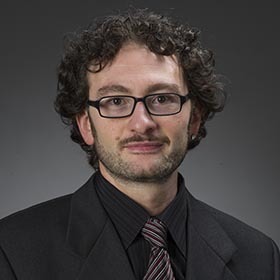
Maurizio Albahari is Associate Professor of Anthropology at the University of Notre Dame, where he is also concurrent Associate Professor in the Keough School of Global Affairs. He is the author of the monographs Crimes of Peace: Mediterranean Migrations at the World’s Deadliest Border (University of Pennsylvania Press, 2015) and Tra la Guerra e il Mare: Democrazia Migrante e Crimini di Pace (Manifestolibri, Italy, 2017). His articles and editorials on refugee mobility, human rights, and civic engagement in the Euro-Mediterranean region have appeared in interdisciplinary and news media venues including the Journal on Migration and Human Security, Social Research, Humanity, Anthropology Today, Anthropology News, Anthropological Quarterly, History News Network, openDemocracy, Perspektif Magazine, Fox News, and CNN.
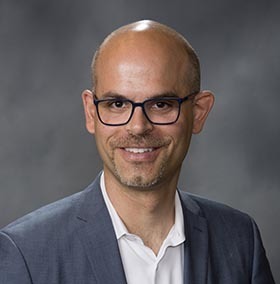
Tobias Boes is Associate Professor of German at the University of Notre Dame and the author, most recently, of Thomas Mann’s War: Literature, Politics, and the World Republic of Letters (Cornell UP, 2019). In November 1989, he was thirteen years old and a student at the John-F.-Kennedy German-American Community School in West Berlin.
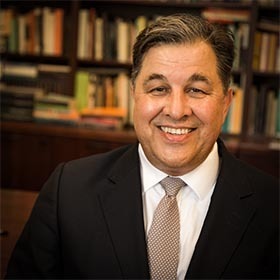
Martin Kagel is associate dean of the Franklin College of Arts and Sciences at the University of Georgia. He also serves as primary contact for several institutes. In addition, Dr. Kagel oversees Franklin College activities associated with international education. Dr. Kagel is the A. G. Steer professorship in the Department of Germanic & Slavic Studies, which he served for ten years as department head. His research focuses primarily on eighteenth and twentieth-century German literature and culture. Dr. Kagel has been a Lilly Teaching Fellow and has received the Sandy Beaver Award for Excellence in Teaching as well as the Richard B. Russell Undergraduate Teaching Award.
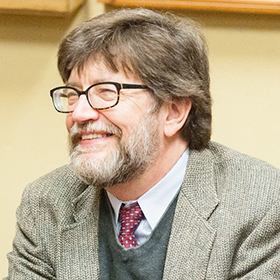
A. James McAdams is the William M. Scholl Professor of International Affairs. For 16 years, he was Director of the Nanovic Institute for European Studies. He has also served as chair of the Political Science department. McAdams has written widely on European affairs, especially on central Europe. His books include East Germany and Detente, Germany Divided, Judging the Past in Unified Germany, and The Crisis of Modern Times. His latest book, Vanguard of the Revolution: The Global Idea of the Communist Party (Princeton University Press, 2017) examines the political history of the party from the 1840s to the present. Vanguard of the Revolution was named one of the Best Books of 2018 by Foreign Affairs. He is now working on the topic of “European and American New Right Thinkers and the Threat to Liberal Democracy.” McAdams is the recipient of honorary doctorates from the Catholic University of Ukraine and the John Paul II Catholic University of Lublin.
Sunday, November 10, 2019
9:00 A.M. BREAKFAST
- The Forum, First Floor, Jenkins Nanovic Halls
9:30 - 11:00 A.M. CROSSING BORDERS AND CONTESTING IDENTITIES
- Elizabeth E. Nanovic Seminar Room, 1050 Jenkins Nanovic Halls
Commentator: Reverend Robert Dowd, C.S.C., University of Notre Dame
Patrick Ireland, Illinois Institute of Technology | “Neither Nationalism nor Statism: Explaining Orthodox Churches’ Responses to Migration in Southeastern Europe”
Elena Popa, Indiana University | “Travelling Nationalism: Romanians in France and the Roma-Romanian Conflation after 1989”
John Borneman, Princeton University | “Germany: The State of the Nation in 2019”
11:00 A.M. FINAL BOXED LUNCH
1989 is sponsored by the Nanovic Institute for European Studies, a member of the Keough School of Global Affairs at the University of Notre Dame, as well as:
- The Institute for Scholarship in the Liberal Arts (ISLA) supports and promotes the research, scholarship, and creative endeavors of University of Notre Dame faculty, graduate students, and undergraduates in the College of Arts and Letters.
- The German Academic Exchange Service (DAAD) supports German Studies and German language programs across the globe. DAAD has generously offered to support 1989.
- The Kellogg Institute for International Studies promotes research excellence on critical global challenges, with a particular focus on democracy and human development. Building on a core interest in Latin America and Africa, the Kellogg Institute fosters research on the developing world and beyond.
Additional support provided by the Departments of German & Russian Languages and Literatures, Political Science, Anthropology, and Film, Television, and Theatre in the College of Arts and Letters, University of Notre Dame.
Other Campus Resources
Going beyond the conventional focus on scholarly panels, the conference will also draw upon the resources of other units in the university:
- The DeBartolo Performing Arts Center is an inclusive destination for enjoying the region’s premier cinematic and performing arts programs. An extensive schedule of independent art house film screenings and the Presenting Series’ season of music, dance, and theater reflect Notre Dame’s Catholic character and the academy’s pursuit of knowledge.
- The Eck Visitors Center, adjacent to the Hammes Notre Dame Bookstore, stands close to the Notre Dame Avenue entrance to campus. Both buildings opened in 1998 to serve as a first stop for visitors. The Eck Center houses a 150-seat auditorium and presents an introductory video about Notre Dame.
- Hesburgh Libraries connects people to knowledge across time and space. It is the library’s job to acquire, preserve, organize, and steward this knowledge in a way that makes it accessible for study by all scholars throughout time. To this end, the Hesburgh Libraries contributes to the mission of the University by providing distinctive collections, expertise, services, and spaces that enhance teaching, learning, and research for and in collaboration with the University community.
Parking & Venues
Jenkins Nanovic Halls are located on Notre Dame Avenue across the street from the Eck Visitors Center.
Venues
1. Morris Inn
2. Eck Visitors Center
3. Jenkins Nanovic Halls
4. DeBartolo Performing Arts Center
Parking
A. Visitor Lot (paid parking)
B. Eddy Street Commons (paid parking)
C. Walsh Architecture Lot
D. Stadium Lot
Friday BEFORE 4 PM
Paid Parking Only
A-Visitor Lot or B-Eddy Street Commons
Friday AFTER 4 PM, Saturday, & Sunday
Free Parking in any lot with an open gate
C-Walsh Architecture Lot or D-Stadium Lot
Parking Pay Stations
During regular business hours (Monday-Friday, 6 a.m. - 4 p.m.), visitors must purchase a permit at a pay station (credit cards only). The permit must be displayed face up on the driver’s side of the vehicle’s dashboard- visible to parking enforcement staff. No permit is required outside of regular business hours and on holidays.
Notre Dame Rate Schedule
Please click here to see a map showing the location of the pay stations.
- 1hr - Free
- 2hrs - $1
- 3hrs - $2
- 4hrs - $3
- 4+hrs - $8
Please note Eddy Street Commons Garage has a different rate schedule
